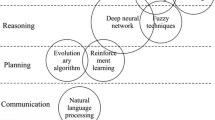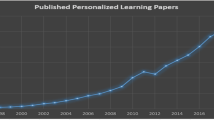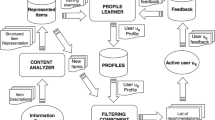Abstract
The enormity of the amount of learning materials in e-learning has led to the difficulty of locating suitable learning materials for a particular learning topic, creating the need for recommendation tools within a learning context. In this paper, we aim to address this need by proposing a novel e-learning recommender system framework that is based on two conceptual foundations—peer learning and social learning theories that encourage students to cooperate and learn among themselves. Our proposed framework works on the idea of recommending learning materials with a similar content and indicating the quality of learning materials based on good learners’ ratings. A comprehensive set of experiments were conducted to measure the system accuracy and its impact on learner’s performance. The obtained results show that the proposed e-learning recommender system has a significant improvement in the post-test of about 12.16% with the effect size of 0.6 and 13.11% with the effect size of 0.53 when compared to the e-learning with a content-based recommender system and the e-learning without a recommender system, respectively. Furthermore, the proposed recommender system performed better in terms of having a small rating deviation and a higher precision as compared to e-learning with a content-based recommender system.








Similar content being viewed by others
References
Adomavicius, G., & Tuzhilin, A. (2005). Toward the next generation of recommender systems: A survey of the state-of-the-art and possible extensions. IEEE Transactions on Knowledge and Data Engineering, 17(6), 734–749.
Aijuan, D., & Baoying, W. (2008). Domain-based recommendation and retrieval of relevant materials in e-learning. In IEEE international workshop on semantic computing and applications 2008 (IWSCA ‘08) (pp. 103–108).
Bandura, A. (1977). Social learning theory. Englewood Cliffs, NJ: Prentice-Hall.
Bobadilla, J., Serradilla, F., Hernando, A., & MovieLens. (2009). Collaborative filtering adapted to recommender systems of e-learning. Knowledge-Based Systems. doi:10.1016/j.knosys.2009.01.008.
Castells, P., Fernandez, M., & Vallet, D. (2007). An adaptation of the vector-space model for ontology-based information retrieval. IEEE Transaction on Knowledge and Data Engineering, 19(2), 261–272.
Chen, C. M., Lee, H. M., & Chen, Y. H. (2005). Personalized e-learning system using item repository theory. Computers & Education, 44(3), 237–255.
De Bra, P., Smith, D., & Stash, N. (2006). The design of AHA! In Proceedings of the seventeenth conference on hypertext and hypermedia (pp. 133–134). Odense.
Eleni, M., & John, K. (2008). Utilizing vector space models for user modeling within a learning environments. Computers & Education, 51(2), 493–505.
Felferning, A., Friedrich, G., & Schmidt-Thieme, L. (2007). Recommender systems. IEEE Intelligent Systems, 22(3), 18–21.
Hernandez del Olmo, F., & Gaudioso, E. (2008). Evaluation of recommender systems: A new approach. Expert Systems with Applications, 35(3), 790–804.
Kerkiri, T., Manitsaris, A., & Mavridou, A. (2007). Reputation metadata for recommending personalized e-learning resources. In Proceedings of the second international workshop on semantic media adaptation and personalization (pp. 110–115). Uxbridge.
Khribi, M. K., Jemni, M., & Nasraoui, O. (2009). Automatic recommendations for e-learning personalization based on web usage mining techniques and information retrieval. Educational Technology & Society, 12(4), 30–42.
Kim, Y., & Baylor, A. L. (2006). A social-cognitive framework for designing pedagogical agents as learning companions. Educational Technology Research and Development, 54(6), 569–596.
Kunaver, M., Pozrl, T., Pogacnik, M., & Tasic, J. (2007). Optimisation of combined collaborative recommender systems. International Journal of Electronics and Communications, 61(7), 433–443.
Liang, G., Weining, K., & Junzhou, L. (2006). Courseware recommendation in e-learning system. In Advances in web based learning—ICWL2006 (pp. 10–24). Berlin/Heidelberg: Springer.
Liu, F., & Shih, B. (2007). Learning activity-based e-learning material recommendation system. In Proceedings of the ninth IEEE international symposium on multimedia workshops (ISMW’07) (pp. 343–348). Beijing, China.
Matsuo, Y., & Ishizuka, M. (2004). Keyword extraction from a single document using word co-occurrence statistical information. International Journal of Artificial Intelligence Tools, 13(1), 157–169.
Moodle. (2009). Retrieved March 17, 2009, from http://moodle.org/.
MovieLens Data Sets. (2009). Retrieved May 02, 2009, from http://www.grouplens.org/node/73.
Otair, M. A., & Hamad, A. Q. A. (2005). Expert personalized e-learning recommender system. http://medforist.grenoble-em.com/Contenus/Conference%20Amman%20EBEL%2005/pdf/21.pdf.
Santos, O. C., & Boticario, J. G. (2008). Recommendation strategies for promoting eLearning performance factors for all. In The 6th workshop on intelligent techniques for web personalization & recommender systems. Illinois, USA.
Soonthornphisaj, N., Rojsattarat, E., & Yim-ngam, S. (2006). Smart E-learning using recommender system. In Computational intelligence (Vol. 4114, pp. 518–523). Berlin/Heidelberg: Springer.
Tai, D. W., Wu, H., & Li, P. (2008). Effective e-learning recommendation system based on self-organizing maps and association mining. The Electronic Library, 26, 329–344.
Tan, H., Guo, J., & Li, Y. (2008). E-learning recommendation system. In The 2008 international conference on computer science and software engineering (Vol. 5, pp. 430–433).
Tang, T. Y., & McCalla, G. (2003). Smart recommendation for an evolving e-learning system: Architecture and experiment. International Journal on E-learning, 4(1), 105–129.
Topping, K. J. (2005). Trends in peer learning. Educational Psychology, 25(6), 631–645.
Yoon, H. C., & Jae, K. K. (2004). Application of web usage mining and product taxonomy to collaborative recommendations in e-commerce. Expert Systems with Applications, 26(2), 233–246.
Zaiane, O. R. (2002). Building a recommender agent for e-learning systems. In Proceedings of the international conference on computers in education (ICCE’02) (pp. 55–59). Auckland, New Zealand.
Zheng, Y., & Li, L. (2008). A three-dimensional context-awareness model for peer recommendation in the e-learning context. International Journal on E-Learning (IJEL), 7(1), 153–168.
Author information
Authors and Affiliations
Corresponding author
Rights and permissions
About this article
Cite this article
Ghauth, K.I., Abdullah, N.A. Learning materials recommendation using good learners’ ratings and content-based filtering. Education Tech Research Dev 58, 711–727 (2010). https://doi.org/10.1007/s11423-010-9155-4
Published:
Issue Date:
DOI: https://doi.org/10.1007/s11423-010-9155-4




